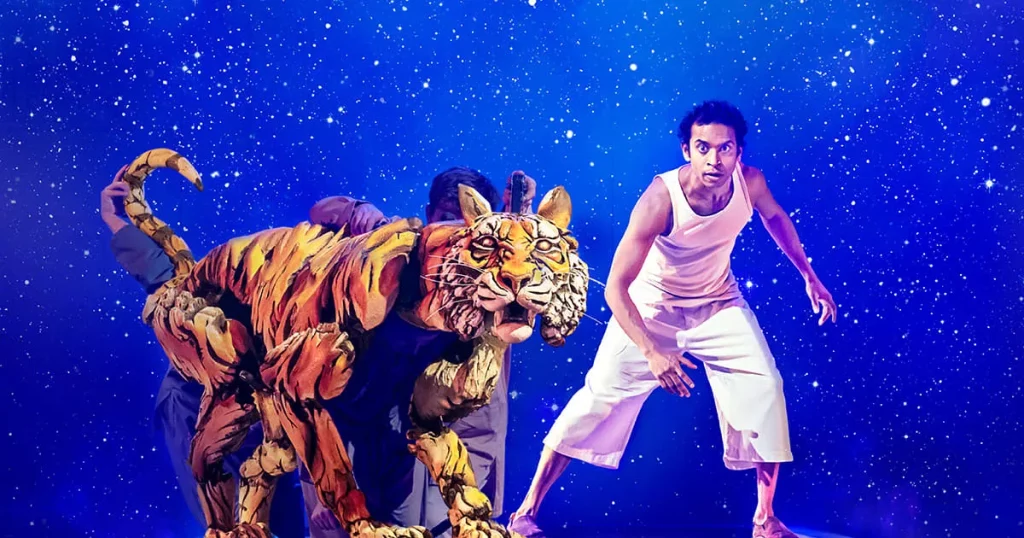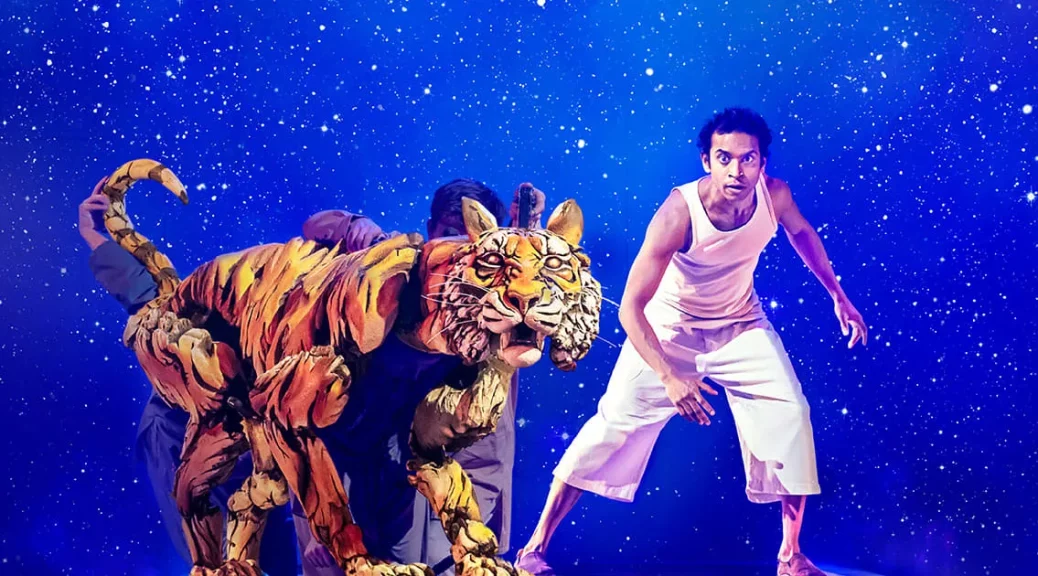
 (3 / 5)
(3 / 5)
Press Night Oct 18th 2023
‘A visual feast…’
Those who watched Ang Lee’s film adaptation of Yann Martel’s 2001 novel will be familiar with the premise of Life of Pi. A young 16-year old boy from Pondicherry in India is launched into an epic adventure as the ship carrying his family and their zoo to a new life in Canada sinks – and he finds himself adrift in the ocean with only a fearsome Bengal tiger for company.
Through the prism of Pi’s recollections later in a hospital ward, we hear how he survives 227 days at sea – and how the narrative which we come to believe – as bizarre and hallucinogenic it seems – is later completely turned on its head.
This is a story exploring themes of religion, the complexities of people, the sanctity and sentience of animals and the sheer will to survive. The degree to which this stage adaptation adds to or takes away from both the book and Ang Lee’s film adaptation is up for debate, however.
Previous reactions to the stage tour all seem to touch on this production being a “visual feast” or “an incredible visual adaptation”, “aesthetically pleasing” or that the puppeteers and animals steal the show. This is most certainly true – the production’s stunning set, magical special effects and masterful puppetry will wow the senses and pack a visual punch.
But some of the book and film’s deeper delves into the philosophies of the human experience and the hypocrisies of religion are lost somewhat in this truncated stage adaptation. Speaking for myself and my father, seeing this stage show for the first time, we found ourselves disliking and feeling upset by some of the depictions of animal suffering. Truth be told, we can’t even stomach David Attenborough’s programmes these days.
This unease mind you, is probably a sign of the incredibly well-executed puppetry and choreography by the team. This did remind me also of the discomfort I felt watching Ang Lee’s film. So absorbed was I by the idea that the animals were suffering, I probably missed some of the intended broader points of the story. The highlight of this production, then becomes focused on the mode of delivery of the story rather than the story itself. Because the plot is pretty harrowing and – to quote a former colleague of mine who I bumped into in the show’s interval: “pretty grim”.
This is not a stage show that will not exactly elevate or lift you as some productions can. It illustrates the difficult line writers and directors tread in that no creative really wants to spoon feed their audience and only serve up neat and today tales in a pretty little bow. But in the quest to make us think and engage us with what’s going on via the mechanisms of the stage production, we lose the potential to get under the skin of the characters and get to know them well. The characters become pawns for pondering the story, rather than characters you truly care about. Life of Pi is also an exploration of the stories we tell and how they come to form part of our “truth” – and as an audience you’ll be confronted with these idiosyncrasies in live time, preferring one version of “truth” over another.
As an audience, we become desperate for those light moments of relief when Pi makes a quip, when the stars come out, when the glowing wiggly fish arrive because we’re reminded of the moments of light relief and beauty in a world that can be truly depressing and awful at times. As Pi tells Ms Okamoto in the hospital ward: “I’ve had a TERRIBLE journey…”
Life of Pi in 2023 hits differently. You’ll think about how some things never change. When Pi’s family flee India due to the dangerous unrest (supposedly echoing Indira Ghandi’s 1976 declaration of “The Emergency”), you’ll ponder the plight of others in the world who now face becoming refugees in hostile territories, as we see playing out when the family are treated poorly by crew and passengers on route to Canada.
Huge congratulations and oceans of praise must go to the energetic and engaging Divesh Subaskaran playing Pi. His physicality and presence in the lead role is stupendous, leaping from one side of the boat / bed to the other and embodying all of the trauma, hope and mania of Pi during his tumultuous journey across the sea. His stamina, his powerful voice, warmth and wit shine through even in the bleakest of times. You are rooting for him from the very beginning and willing for his terrible story to take a turn for the better. The chemistry and rapport between Divesh and Keshini Misha playing Pi’s sister Rani is sweet, offering up a ray of hope ahead of the family’s ill-fated journey.
Finally, the purveyors of the visual magic in this show have to be set and costume designer Tim Hartley, Puppetry and Movement Director Finn Caldwell. The lighting, visual effects and projections in this production are wonderful thanks to Andrzej Goulding and Tim Lutkin.
Life of Pi may not be an easy watch – but it’s certainly a beautiful one.

